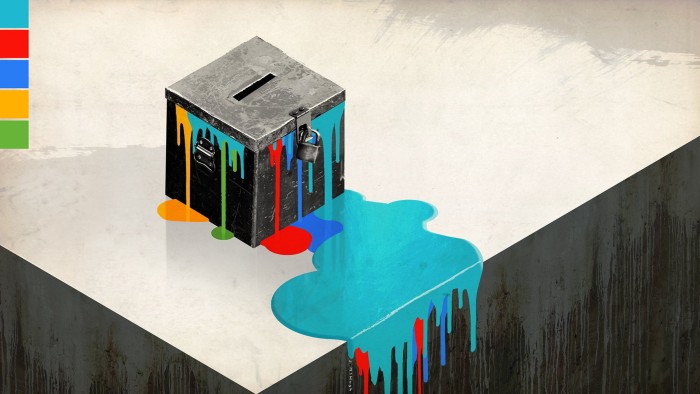Unlock the Editor’s Digest for free
Roula Khalaf, Editor of the FT, selects her favourite stories in this weekly newsletter.
There is one inescapable message from this week’s elections in England. Reform UK is now a real threat to the political order. Nigel Farage has the most valuable commodity in politics — momentum.
There’s always a danger of reading too much into local elections, given the opportunity they offer to register a protest vote. But in our new five-party system, those who want to declare “a plague on all their houses” can cast their votes for parties whose influence may endure.
The Conservatives are struggling to seem relevant. Labour has lost a safe parliamentary seat to Reform in Runcorn and Helsby, and has Farage’s party breathing down its neck even in places like Doncaster and North Tyneside, where it won mayoralties by a whisker. The next general election could yet produce some kind of Westminster coalition on the left, between Labour, the Liberal Democrats and the Greens. Or on the right — although Farage’s aim is to destroy the Tories.
There is a sense that Britain is “broken”, that nothing works and no one in charge knows quite what to do. It’s striking how enthusiastic Reform voters are to declare their allegiance. That’s the galvanising effect of insurgency.
There may yet be a ceiling to Farage’s ambitions. He has a history of falling out with people, some of his candidates may not survive scrutiny, and his past warmth towards Donald Trump and Vladimir Putin is unpopular. But Reform’s prospects are better than his current handful of MPs might suggest. First past the post elections will deliver unexpected outcomes in a three or four-way battle. Moreover, it’s unwise to underestimate the architect of Brexit. King’s College London professor Vernon Bogdanor has said that Farage’s Ukip party “broke the mould” of British politics in a way the SDP never managed in the 1980s.
It’s perfectly possible to dilute Reform’s appeal. Farage’s platform combines distrust of elites with hostility to immigration. Starmer should point out that Brexit has made the country poorer. And move faster to reset the EU relationship. He should stop being squeamish about this, and about tackling immigration. Illegal immigration, in particular, is poisoning our politics and trust in institutions.
For half a century, both main parties have promised tighter immigration controls, and more deportations. Tony Blair first did so in 2001. Neither party delivered. In recent days, the number of people arriving in small boats hit a new high for this early in the year. In opposition, Labour claimed the boats were topping opinion polls only because the Tories were stoking the issue. In government, they realise these arrivals are a simmering source of public despair.
Adding to a palpable sense that the country has lost its way is a series of legal appeals in which convicted foreign criminals have avoided deportation by convincing tribunals to make astonishingly broad interpretations of the right to family life, enshrined in the European Convention on Human Rights. Britain is a tolerant country. But we have got the balance wrong between the public interest and that of individuals.
A flurry of announcements has been designed to suggest the government is taking this seriously. Home secretary Yvette Cooper is reviewing how courts interpret the ECHR. The justice secretary told a parliamentary committee that some of the decisions made about illegal migrants and foreign criminals do not stand up to scrutiny. A new law has been promised to remove asylum rights from foreign nationals who commit sex crimes.
Are these moves more than gimmicks? It is not yet clear. But the impetus for change is not only from the right. Labour backbenchers have urged an overhaul of the ECHR. A former lord chief justice has broken the judicial omerta by suggesting there may be a case to do so.
Other European countries take a more muscular approach. Denmark, which was criticised by MEPs for closing its borders to Syria in 2015, has gradually reduced the number of residency permits issued to refugees, and has a strong focus on integration. Its prime minister says these policies are popular with poorer voters on the left.
France, meanwhile, has a long history of deporting illegal migrants. In 2023, it even deported an alleged radical Islamist to Uzbekistan, despite an injunction from the Strasbourg human rights court. It has since passed laws to make it easier to deport foreign residents if they receive a criminal conviction or are deemed a grave threat to public order.
Neither country is an international pariah. The British government should be making common cause with them on reforming the convention and the court. It should be issuing guidance to immigration judges about the balance between individual interests and that of the public, and reviewing the way the UK incorporated the ECHR into the Human Rights Act. Digital ID cards would make it harder for illegal migrants to access public services.
None of this would be caving in to Reform but moving to where the public are. With a more volatile electorate, all parties must adapt to face down populism.
“They’re all the same” is a familiar refrain on the doorstep and one that is maddening to hard-working MPs. But eight years on from the Brexit vote, which has made the country poorer, governing elites must take the hint: take back control or someone else will do it for you.




